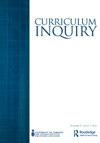“We need a new story to guide us”: Towards a curriculum of Rahma
IF 1.6
3区 教育学
Q2 EDUCATION & EDUCATIONAL RESEARCH
引用次数: 7
Abstract
Abstract Beginning with a storied moment of encounter at an academic conference in which several scholars confidently asserted the need to “humanize those who have been dehumanized”, I engage in autobiographical narrative inquiry into my tensions with this seemingly “common sense” pedagogical belief and curricular approach. I do so by interweaving my stories of experiences as a teacher educator, intergenerational survivor of Palestinian displacement, mother to a dis/abled child, and Canadian Muslim woman in hijab who is all too familiar with a condescending pity of those who project their stories of me—of who they believe me to be and what they believe my experiences to be—upon me. I also draw upon the work and ideas of curriculum, feminist, and cultural scholars and theorists to illuminate how teaching for the humanization of Others can impose borders within and between relational selves in the making. I invite other teacher educators and teachers—including those from within familial curriculum-making worlds—to imagine how we might co-compose what I have come to understand as a curriculum of Rahma alongside children, youth, families, caregivers, colleagues, and others within and across the many places we co-compose curriculum.“我们需要一个新的故事来指导我们”:走向拉赫玛的课程
摘要从一次学术会议上的一个故事性的相遇开始,几位学者自信地断言有必要“将那些被非人化的人人性化”,我进行了自传体叙事式的探究,探究我与这种看似“常识”的教学信仰和课程方法之间的紧张关系。我通过将我作为一名教师教育者、巴勒斯坦流离失所的代际幸存者、一个残疾儿童的母亲和一名戴着头巾的加拿大穆斯林妇女的经历交织在一起,她非常熟悉那些将他们对我的故事——他们相信我是谁,他们相信我的经历是什么——投射到我身上的人的屈尊俯就的怜悯。我还借鉴了课程、女权主义、文化学者和理论家的工作和思想,阐明了为他人的人性化教学如何在关系自我内部和之间强加边界。我邀请其他教师、教育工作者和教师——包括那些来自家庭课程制作世界的教师——想象一下,我们如何与儿童、青年、家庭、照顾者、同事以及我们共同编写课程的许多地方的其他人共同编写我所理解的Rahma课程。
本文章由计算机程序翻译,如有差异,请以英文原文为准。
求助全文
约1分钟内获得全文
求助全文
来源期刊

Curriculum Inquiry
EDUCATION & EDUCATIONAL RESEARCH-
CiteScore
3.10
自引率
17.60%
发文量
37
期刊介绍:
Curriculum Inquiry is dedicated to the study of educational research, development, evaluation, and theory. This leading international journal brings together influential academics and researchers from a variety of disciplines around the world to provide expert commentary and lively debate. Articles explore important ideas, issues, trends, and problems in education, and each issue also includes provocative and critically analytical editorials covering topics such as curriculum development, educational policy, and teacher education.
 求助内容:
求助内容: 应助结果提醒方式:
应助结果提醒方式:


